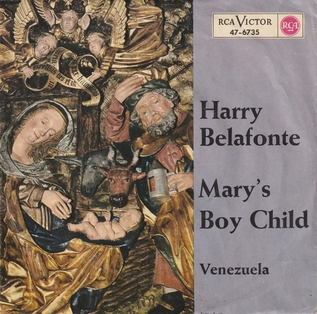
Christmas music comprises a variety of genres of music regularly performed or heard around the Christmas season. Music associated with Christmas may be purely instrumental, or in the case of carols, may employ lyrics about the nativity of Jesus Christ, traditions such as gift-giving and merrymaking, cultural figures such as Santa Claus, or other topics. Many songs simply have a winter or seasonal theme, or have been adopted into the canon for other reasons.

Aled Jones, is a Welsh singer, radio and television presenter, and actor. As a teenage chorister, he gained widespread fame in 1985 with his recording of "Walking in the Air", which reached No 5 in the UK pop chart. He has since worked in television with the BBC and ITV, and on radio for the BBC and Classic FM.

"Jingle Bells" is one of the most commonly sung Christmas songs in the world. It was written in 1850 by James Lord Pierpont at Simpson Tavern in Medford, Massachusetts. It was published under the title "The One Horse Open Sleigh" in September 1857. It has been claimed that it was originally written to be sung by a Sunday school choir for Thanksgiving, or as a drinking song. Although it has no original connection to Christmas, it became associated with winter and Christmas music in the 1860s and 1870s, and it was featured in a variety of parlor song and college anthologies in the 1880s. It was first recorded in 1889 on an Edison cylinder; this recording, believed to be the first Christmas record, is lost, but an 1898 recording - also from Edison Records - survives.

"The Little Drummer Boy" is a popular Christmas song written by American composer Katherine Kennicott Davis in 1941. First recorded in 1951 by the Austrian Trapp Family, the song was further popularized by a 1958 recording by the Harry Simeone Chorale; the Simeone version was re-released successfully for several years, and the song has been recorded many times since. In the lyrics, the singer relates how, as a poor young boy, he was summoned by the Magi to the Nativity of Jesus. Without a gift for the Infant, the little drummer boy played his drum with approval from Jesus's mother, Mary, recalling, "I played my best for him" and "He smiled at me". Despite the song's popularity, the story of the drummer boy is not biblically accurate.

"Happy Xmas (War Is Over)" is a Christmas song released in 1971 as a single by John & Yoko/The Plastic Ono Band with the Harlem Community Choir. It was the seventh single released by John Lennon outside his work with the Beatles. The song reached number four in the UK, where its release was delayed until November 1972, and has occasionally re-emerged on the UK Singles Chart, most notably after Lennon's murder in December 1980, when it peaked at number two.

"Walking in the Air" is a song written by Howard Blake for the 1982 animated film The Snowman based on Raymond Briggs's 1978 children's book of the same name. The song forms the centrepiece of The Snowman, which has become a seasonal favourite on British and Finnish television. The story relates the fleeting adventures of a young boy and a snowman who has come to life. In the second part of the story, the boy and the snowman fly to the North Pole. "Walking in the Air" is the theme for the journey. They attend a party of snowmen, at which the boy seems to be the only human until they meet Santa Claus with his reindeer, and the boy is given a scarf with a snowman pattern. In the film, the song was performed by St Paul's Cathedral choirboy Peter Auty; this performance was reissued in 1985 and 1987.

Gaudete is a sacred Christmas carol, thought to have been composed in the 16th century. It was published in Piae Cantiones, a collection of Finnish/Swedish sacred songs published in 1582. No music is given for the verses, but the standard tune comes from older liturgical books.*
"I Believe" is a popular song written by Ervin Drake, Irvin Abraham, Jack Mendelsohn and Al Stillman in 1953. The most popular version was recorded by Italian-American singer Frankie Laine, and spent eighteen weeks at No. 1 on the UK Singles Chart.

"White Christmas" is an Irving Berlin song reminiscing about an old-fashioned Christmas setting. The song was written by Berlin for the 1942 musical film Holiday Inn. The composition won the Academy Award for Best Original Song at the 15th Academy Awards. Bing Crosby's record topped the Billboard chart for 11 weeks in 1942 and returned to the number one position again in December 1943 and 1944. His version would return to the top 40 a dozen times in subsequent years.

"Mary's Boy Child", also known as "Mary's Little Boy Child", is a 1956 Christmas song written by Jester Hairston. It is widely performed as a Christmas carol.

"Peace on Earth/Little Drummer Boy" is a Christmas song performed by English singer-songwriter David Bowie and American singer Bing Crosby. Recorded on 11 September 1977 at ATV Elstree Studios near London for Crosby's television special Bing Crosby's Merrie Olde Christmas, the song features Crosby singing 1941 standard "The Little Drummer Boy" while Bowie sings the counterpoint tune "Peace on Earth", written by the special's musical supervisors Ian Fraser and Larry Grossman, and scriptwriter Buz Kohan, specifically for the collaboration. The duet was one of Crosby's final recordings before his death in October 1977.

"Dominick the Donkey" is a Christmas song written by Ray Allen, Sam Saltzberg and Wandra Merrell, and was recorded by Lou Monte in 1960, on Roulette Records. The song describes Dominick, a donkey who helps Santa Claus bring presents to children in Italy due to the reindeer, despite their flight, being unable to climb the mountainous terrain. The song was re-released onto Amazon on September 26, 2011, on Dexterity Records. The spelling of "Dominick" was modified to "Dominic" for the re-release. It was included in Volume 2 of the Ultimate Christmas Album series produced by Collectables Records and on the Christmas compilation album Merry Xmas 2011 by Cinquenta Musica.

"It's Not Unusual" is a song written by Les Reed and Gordon Mills, first recorded by a then-unknown Tom Jones, after it had first been offered to Sandie Shaw. He intended it as a demo for her, but when she heard it she was so impressed with his delivery that she recommended he sing it instead.

"Whenever God Shines His Light" is a song written by Northern Irish singer-songwriter Van Morrison and released on his 1989 album Avalon Sunset as a duet with Cliff Richard. Although the album was released in June 1989, this song was released as a single in November 1989 for the Christmas sales market. Morrison and Richard performed the duet on the British music chart television show, Top of the Pops. The single charted at No. 20 on the UK Singles Chart and No. 3 on the Irish Singles Chart. AllMusic critic Jason Ankeny describes it as a "standout opener" to Avalon Sunset. Critic Patrick Humphries describes it as "the most manifest example of Morrison's Christian commitment," claiming that although it "is not one of Morrison's most outstanding songs" it works as "a testament of faith". Cash Box said that "if George Harrison can have a hit single while invoking his sweet Lord, Van could do it with the totally engaging 'Whenever God Shines His Light.'"

"Cannonball" is a song written and performed by Irish folk singer Damien Rice. It was released on 1 February 2002, as the second single from his debut album O. It was later re-released in 2003, 2004 and 2011.

Jonathan Morter is an English radio DJ, social media pioneer and campaigner. He helped launch various internet campaigns. He launched the Condescending Corporate Brand Page, a page that harshly ridicules corporate social media techniques.

One Voice is a 2016 classical music album by Welsh singer Aled Jones and produced by Classic FM. The album features classical and folk songs performed by Jones as a duet with recordings of himself that were made when he was 15 years old. Upon release the album went straight into number 1 on the British Classical Artist Albums Chart and reached number 3 on the UK Album Charts.

One Voice at Christmas is a 2016 Christmas album by the Welsh singer Aled Jones and produced by Classic FM. It was created as a follow-up to Jones' One Voice album released earlier in the year and followed a similar style with Jones duetting on Christmas carols and songs with his younger self. It reached a peak of 22 in the official UK Album Charts and number 1 in the UK Classical Chart.
















